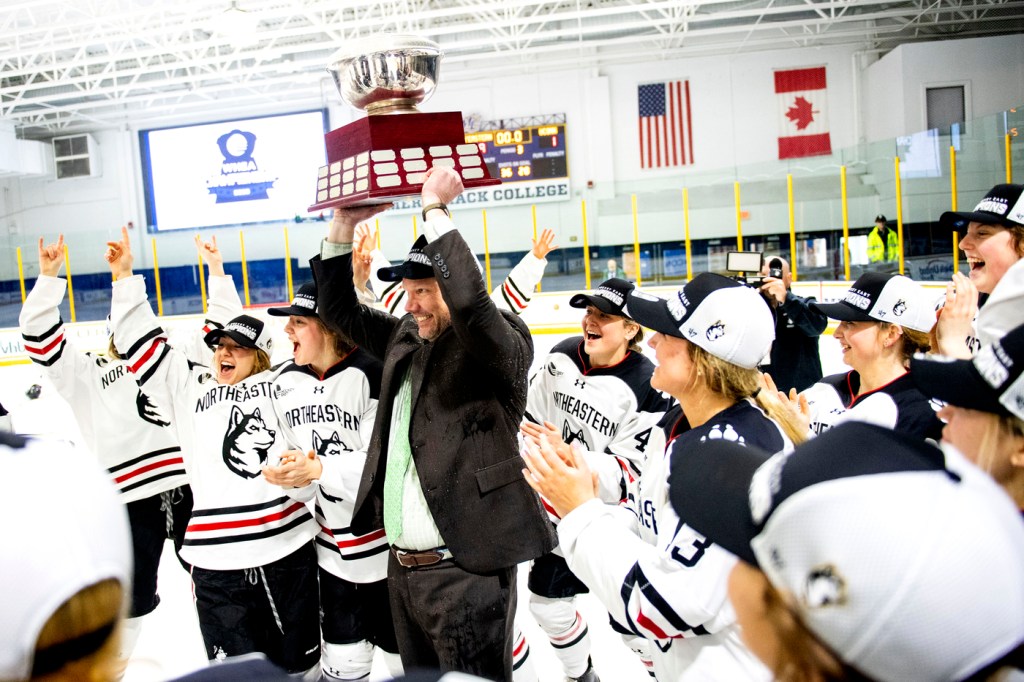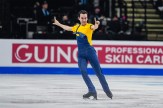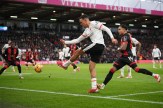Ride a bike? Play badminton? Northeastern’s Dave Flint offers summer training tips for ice hockey players.

Summer is on the horizon—but for ice hockey players, winter is never far away. Dave Flint, coach of Northeastern’s powerhouse women’s team, offers offseason tips and goals to help players of all ages make the most of the warm weather while investing in their skills for next season.
Tip No. 1: Play another sport
“That’s my big tip for younger kids especially,” Flint says. “It doesn’t matter what you do—play baseball, ride your bike—so long as you do things to give your body a break.”
Getting away from organized hockey and playing another sport helps players develop strengths and skills that may transfer to the ice (see below) while enabling them to take a breather from hockey.
“One of the problems we have worldwide is early specialization in sports,” Flint says. “I understand it: Parents pay thousands of dollars to put their kids in camps and help them with private coaches. But by the time the kids get to high school, they might be burnt out.”
Playing another sport for fun can help deepen a player’s love for hockey, insists Flint, who points to Northeastern forward Skylar Irving as someone who grew up starring in field hockey and lacrosse in addition to her chosen sport.
“Be a kid,” Flint says. “Enjoy other sports.”
Tip No. 2: Improve your bursts of speed
“It’s all short, quick bursts in ice hockey,” Flint says. “There are a lot of players who can get to a high speed over a longer distance. But the better players generate that quickness in their first five steps, which makes those players quicker to pucks and more dynamic.”
That explosiveness has defined a number of Huskies, including forward Alina Mueller (who will be team captain next season) and Skylar Fontaine, the departing All-American defender, who was arguably the fastest skater in the nation throughout her Northeastern career.
For improved bursts of speed, Flint recommends running five to seven sprints of no more than 10 to 20 yards.
“There are a bunch of NHL players doing these,” Flint says. “Take a minute of rest in between each sprint to let your body recover. You want maximum effort, and that won’t happen if you do them one after the other.”
It’s also important to add a sense of competition.
“Go up against a timer so that you can tell if you’re getting faster,” Flint says. “Nobody likes doing sprints, and you can sometimes just go through the motions. But if you’re going up against the clock or sprinting against a teammate, that competition is going to push you and get the most out of you.”
Tip No. 3: Pick up a racket
“Some of the better European players that I’ve coached have been really good at racquet sports,” Flint says.
Tennis, racquetball and squash help hockey players improve their hand-eye coordination in high-speed situations, Flint says.
“I coached a kid one time who was an unbelievable badminton player, which is all about short quick bursts and changes in direction—and then you throw in the hand-eye coordination piece of it,” Flint says. “Racket sports and soccer are really big with the European players that I’ve coached over the years.”
There’s another benefit to playing a sport like tennis that will pay off for years to come, adds Flint.
“You want activities that you can do later in life when your hockey career is over,” he says. “These sports can help you with your development today. And then later on, they can help you stay fit and active by doing something you like.”
Tip No. 4: Shoot pucks
On the ice, in your driveway, wherever you may be …
“I always tell kids, if you want to have a better shot, a harder shot, you’ve just got to shoot pucks,” Flint says. “There’s no other way to do it.”
Though there is a way to improve shooting while being paid to do it.
“As kids get older, I tell them one of the best summer jobs you can ever get is to be the shooter at a goalie camp,” Flint says. “They always need shooters. You get paid to shoot hockey pucks, and I guarantee you’ll score more goals next season.”
It’s hard work, warns Flint, who recalls his time as an assistant coach of the men’s team at St. Anselm College in Manchester, New Hampshire, more than two decades ago.
“We had a kid who was a middle-of-the-road scorer for us,” Flint recalls. “He would shoot on the goalies all summer, and at one of the first camps we had, his hands were bleeding. He had blisters all over and I had to wrap up his hands for him because he was shooting so many pucks. His last two years, he led the team in scoring.”
Northeastern’s hardest shooter is Maureen Murphy, who will return to the Huskies in 2022-23 after leading the nation with 30 goals this past season.
“There’s no secret to it,” Flint says. “Repetition, repetition, repetition. Shoot pucks and your shot will get harder and more accurate.”
For media inquiries, please contact media@northeastern.edu.






